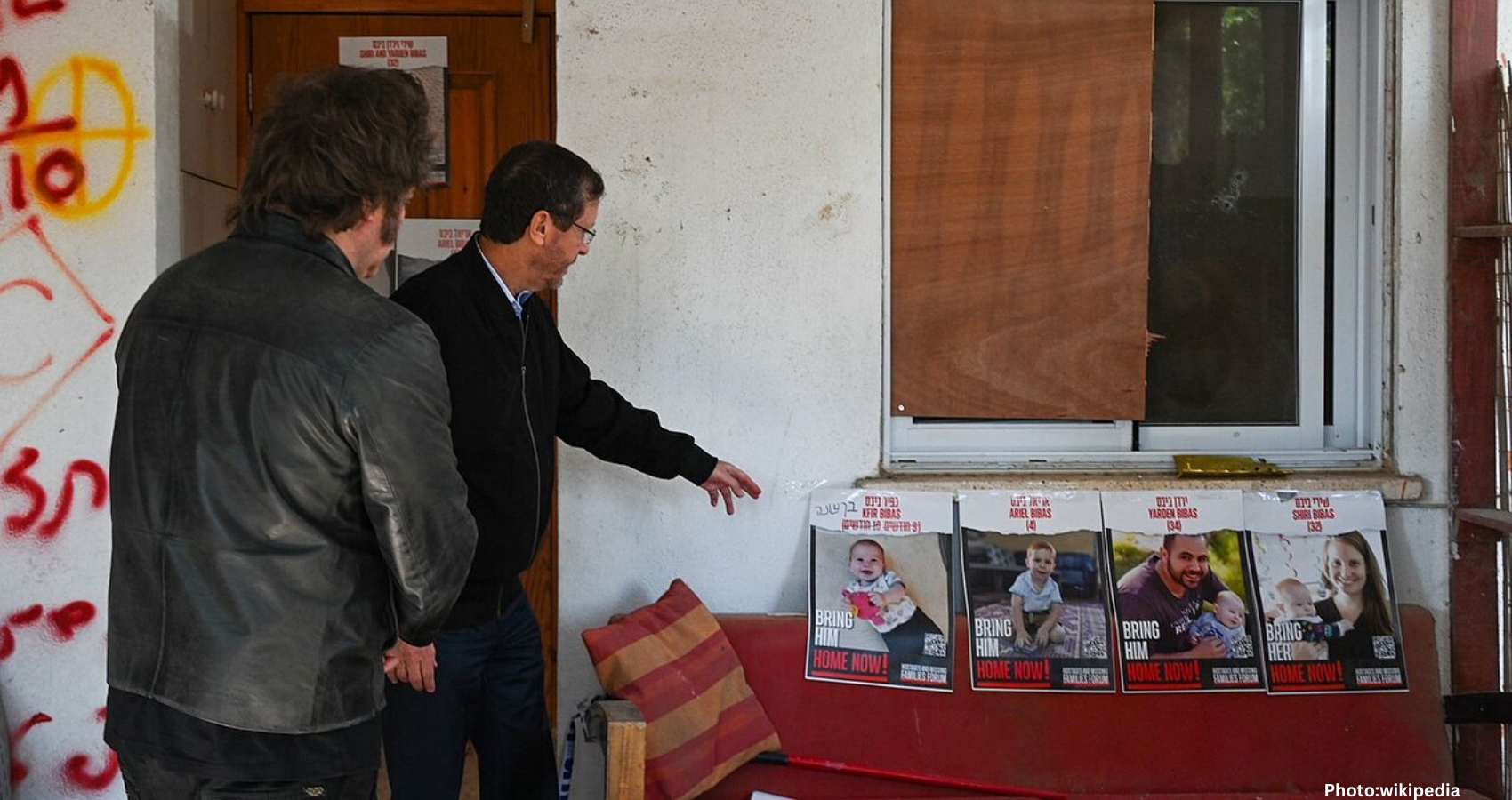A memorial mural in Milan honoring Shiri Bibas and her two sons, victims of Hamas, was vandalized, prompting artist AleXsandro Palombo to condemn the act as antisemitic disguised as activism.
A memorial mural dedicated to Shiri Bibas and her two young sons, Ariel and Kfir, was vandalized earlier this month during a memorial service for victims of the October 7, 2023, Hamas attacks. The mural, created by contemporary pop artist and activist AleXsandro Palombo, commemorates the tragic loss of the Bibas family, who were kidnapped and brutally killed by Hamas terrorists.
Palombo, known for his provocative installations, has previously addressed sensitive topics through his art. One notable piece features the late Pope Francis holding a buoy, with the body of Aylan Kurdi, a three-year-old Syrian toddler who drowned while fleeing conflict, lying at his feet. The Bibas family mural was installed outside the Qatari consulate in Milan, Italy, as a poignant reminder of the violence inflicted by Hamas.
In response to the vandalism, Palombo described the act as an antisemitic gesture masquerading as activism rather than a legitimate form of protest. He expressed his dismay that a mural honoring a mother and her children could be defaced without sparking public outrage, calling it a reflection of a “sick society” and a sign of political and cultural weakness.
“In recent years, parts of the political left and activist movements have legitimized extremist pro-Palestinian factions that promote hatred rather than peace,” Palombo stated. “They exploit the rights of Palestinians, effectively serving the propaganda of Hamas.” The mural’s defacement obscured Shiri’s face with an image originally created by Vancouver street artist iHeart, depicting a boy crying over Instagram likes, symbolizing a troubling addiction to digital validation.
Creative modifications to the mural included a red bullseye stamped on the boy’s forehead, with the words “No War” displayed beneath. This artwork gained viral attention in 2014 after being noticed by the elusive artist Banksy, highlighting the ongoing discourse surrounding art and its societal implications.
Palombo characterized the vandalism of the Bibas family mural as “not an act of protest, but a serious desecration.” He emphasized that the act was not a dialogue between works of art but rather a deliberate attempt to erase a specific, painful memory. “It is an attempt to replace a documented memory with a generic, emotional image that mocks and lends itself to manipulation,” he said. “This act strips suffering of its significance, turning it into an ideological mask.”
The identity of the individual responsible for defacing the mural remains unknown. However, Palombo noted that Islamic fundamentalism appears to be gaining traction, even in Milan, a city he believes should embody openness, democracy, and civic awareness. He asserted that antisemitism played a role in the defacement, stating, “The message is not ambiguous; it’s an antisemitic act disguised as activism, exploiting aesthetics to channel a form of cultural radicalization.”
Palombo further elaborated on the nature of contemporary antisemitism, explaining that it often manifests subtly, infiltrating public discourse and art to undermine memory and normalize hatred. “Antisemitism today doesn’t march; it seeps in,” he remarked. “When freedom of expression is used to deny that of others, it’s no longer freedom; it’s a strategy of destabilization.”
The vandalism of the Bibas family mural is not the first instance of Palombo’s work being disrespected. In 2024, just hours after unveiling a mural dedicated to Nova Festival survivor Vlada Patapov, the artwork was damaged. Other murals dedicated to Holocaust survivors, including Sami Modiano, Liliana Segre, and Edith Bruck, have also faced vandalism in the past.
“My art is not decoration; it is testimony,” Palombo asserted. “Anyone who thinks they can erase it with a spray can or a threat has already lost.” Although Palombo is not Jewish, he has faced a barrage of antisemitic insults and death threats over the past three years. He acknowledges the risk of vandalism but views it as part of the ongoing struggle for memory and recognition.
“Balancing the need to honor the victims with the challenges of public art means accepting that every work is also a stronghold, an act of visual resistance,” he explained. “And if someone defaces it, they don’t weaken it; they make it even more necessary.”
Source: Original article

